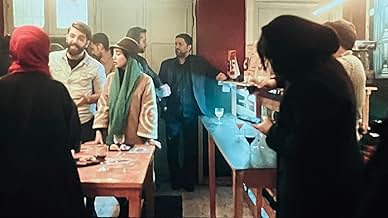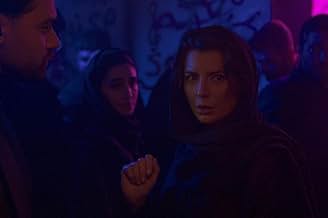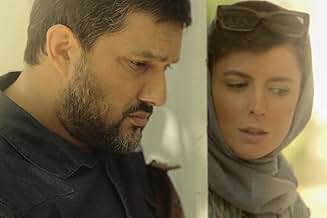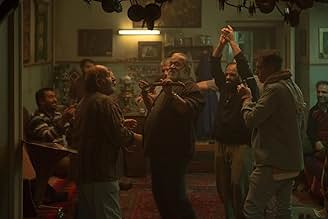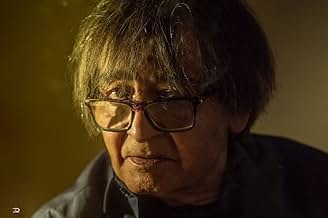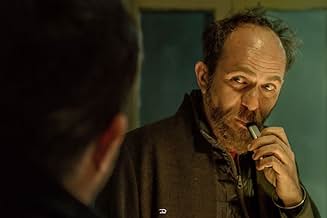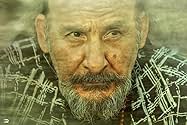Pir Pesar
- 2024
- 3h 12min
CALIFICACIÓN DE IMDb
7.9/10
1.7 k
TU CALIFICACIÓN
Dos hermanos iraníes viven con su padre abusivo. Cuando él alquila a una joven con intención de casarse con ella, la atracción de ella por el hijo mayor crea tensión en su ya fracturada fami... Leer todoDos hermanos iraníes viven con su padre abusivo. Cuando él alquila a una joven con intención de casarse con ella, la atracción de ella por el hijo mayor crea tensión en su ya fracturada familia.Dos hermanos iraníes viven con su padre abusivo. Cuando él alquila a una joven con intención de casarse con ella, la atracción de ella por el hijo mayor crea tensión en su ya fracturada familia.
- Premios
- 3 premios ganados y 1 nominación en total
- Dirección
- Guionista
- Todo el elenco y el equipo
- Producción, taquilla y más en IMDbPro
Opiniones destacadas
The Old Bachelor," directed by Oktay Barahani, was for me more than just a typical drama. With Hassan Pourshirazi's outstanding performance as Gholam Bastani, the film skillfully portrays the archetype of the "Puer Aeternus" or "Eternal Youth." This character, despite his age, remains emotionally stunted, refusing to embrace the responsibilities of adulthood.
This interpretation is reinforced by Gholam's own pivotal dialogue: "A man whose life has no rules or order, even if he grows old, will remain an old boy and never truly grow up!" Furthermore, one can observe echoes of "Dionysus," the god of ecstasy and liberation, within Gholam Bastani, which perfectly complements the "Eternal Youth" aspect of his character. This is a profound and thought-provoking film that delves into the psychological layers of humanity.
This interpretation is reinforced by Gholam's own pivotal dialogue: "A man whose life has no rules or order, even if he grows old, will remain an old boy and never truly grow up!" Furthermore, one can observe echoes of "Dionysus," the god of ecstasy and liberation, within Gholam Bastani, which perfectly complements the "Eternal Youth" aspect of his character. This is a profound and thought-provoking film that delves into the psychological layers of humanity.
The movie "The Old Bachelor" can be an interesting experience for any viewer in Iranian cinema. From the very first scenes of the film, the viewer realizes the difference between this film and other Iranian films. The special framing and color attract more attention. The introduction and foundation of Gholam's character is done well and we as viewers get to know him well. The character of Rana, who plays a central role in the second half of the film, also has a good foundation, but this introduction and completion of the character introduction could have helped the film to be better if it had been formed earlier. But the worst characterization and perhaps acting of this film was Ali, the son of Gholam, played by Hamed Behdad. Ali's character is a ready-made character type. You can see characters like this outside the film in many series and films, but in this film you should not see exactly or even worse than other cases. Ali, regardless of his personality, is the son of Gholam. Being the son of Gholam should make Ali different. Hamed Behdad's acting was also insensitive. But this does not mean that this character does not do his job well in the film. The film uses the character it created and does not falter. The cinematography is one of the strengths of the work, which imprints lasting scenes in the viewer's mind. Although the script is very well-written and logical, there are several minor flaws that prevent it from being completed. For example, where does the father get so much money? Ali and Reza's exit at the end of the film and creating a situation for Gholam was completely to advance the story and there was no strong logic behind it. And the most important point is that more work should have been done on completing the characters (especially Ali's character).
The ending is also shocking and perhaps impressive at first, but in the end it was rushed and ineffective. After an hour, the ending is not at all the part of the film that you want to talk about. It even lacked logic in some ways! The final conflict, which could have been the peak of the story and narrative, became the only point to end the film and only ended the story. Although despite all this, the mise-en-scène of the last minutes of the film was unique in Iranian cinema.
In the end, we saw a film that was several levels better than other Iranian films in recent years, and all the negative points I mentioned above do not prevent you from enjoying this film and making it one of the best Iranian films you have ever seen. In my opinion, if the above points were corrected, they would have made this film more memorable.
The ending is also shocking and perhaps impressive at first, but in the end it was rushed and ineffective. After an hour, the ending is not at all the part of the film that you want to talk about. It even lacked logic in some ways! The final conflict, which could have been the peak of the story and narrative, became the only point to end the film and only ended the story. Although despite all this, the mise-en-scène of the last minutes of the film was unique in Iranian cinema.
In the end, we saw a film that was several levels better than other Iranian films in recent years, and all the negative points I mentioned above do not prevent you from enjoying this film and making it one of the best Iranian films you have ever seen. In my opinion, if the above points were corrected, they would have made this film more memorable.
The Old Bachelor is one of those rare films that dares to be honest. It doesn't shout or preach-it simply presents. The relationship that slowly forms between the characters played by Leila Hatami and Hamed Behdad may feel natural, even ordinary, in real life, but within the narrow confines of Iranian cinema, it feels fresh, bold, and quietly subversive.
Leila Hatami delivers a subtle, layered performance-once again showing how a female character can be portrayed with depth and nuance, without melodrama or overstatement. She plays a tired, complex, emotionally wounded woman whose silences carry meaning and weight.
Opposite her, Hamed Behdad brings a restless energy to the screen. His character, impulsive and raw, becomes the perfect counterbalance to Hatami's restraint. What emerges between them is not a typical love story, but a human connection that grows out of shared loneliness and mutual understanding-a kind of emotional recognition more than romance.
Meanwhile, Hassan Pourshirazi grounds the film with a deeply lived-in performance. He doesn't so much play the role as inhabit it. His quiet presence and expressive stillness lend the story an earthy authenticity.
The Old Bachelor tells a story that, in the real world, might pass unnoticed. But in Iranian cinema-often limited by censorship and symbolic overcomplication-this kind of direct, emotionally honest narrative feels both unusual and necessary. That contrast is what makes the film so compelling.
Leila Hatami delivers a subtle, layered performance-once again showing how a female character can be portrayed with depth and nuance, without melodrama or overstatement. She plays a tired, complex, emotionally wounded woman whose silences carry meaning and weight.
Opposite her, Hamed Behdad brings a restless energy to the screen. His character, impulsive and raw, becomes the perfect counterbalance to Hatami's restraint. What emerges between them is not a typical love story, but a human connection that grows out of shared loneliness and mutual understanding-a kind of emotional recognition more than romance.
Meanwhile, Hassan Pourshirazi grounds the film with a deeply lived-in performance. He doesn't so much play the role as inhabit it. His quiet presence and expressive stillness lend the story an earthy authenticity.
The Old Bachelor tells a story that, in the real world, might pass unnoticed. But in Iranian cinema-often limited by censorship and symbolic overcomplication-this kind of direct, emotionally honest narrative feels both unusual and necessary. That contrast is what makes the film so compelling.
Loneliness and the struggle to maintain a relationship are concepts that are intensely highlighted in Pirpesar (The Old Bachelor). Oktay Baraheni's film, with a deep and dramatic gaze into a patriarchal Iranian family, attempts to depict the psychological and social complexities of its members. In this family, where the father's authoritarian dominance overshadows all relationships, the characters grapple not only with external pressures but also with their own internal conflicts. Baraheni skillfully portrays the clash between two generations and two opposing mindsets-one firmly rooted in old traditions and the other striving for change and an independent identity in the modern world. Beneath these generational conflicts, the despair and struggle to preserve family bonds under harsh circumstances are vividly portrayed, where every movement and word of the characters seem to echo an internal battle for peace and balance in a male-dominated world.
The father, played masterfully by Hassan Pourshirazi, is the embodiment of a patriarchal system whose dominance extends beyond the social sphere into the psychological and emotional realms of his family. While maintaining an outward display of authority, this tyrannical father wrestles with internal crises and contradictions, which the film gradually unveils. His character reveals that those who appear powerful on the surface may be plagued by deep psychological wounds and struggles. Though he controls his family with absolute authority, he represents an older generation whose dominance seems unshakable. However, the screenplay skillfully dismantles this authority, gradually passing the power down to the next generation-his children.
And then there is Hamed Behdad-an actor who, with his exceptional command of body language and dialogue, precisely conveys the shadow of patriarchal oppression hanging over the next generation. His character struggles to overcome his father's authoritarian rule, and through his outstanding performance, free of any unnecessary dialogue or exaggeration, he captures the profound emotional turmoil of his character with just his gaze. His eyes become the unspoken language of his character, conveying love, respect, defeat, and authority with silent intensity. Through his mastery of acting in silence, Behdad crafts moments where words become irrelevant, and only the raw emotions and internal struggles of his character remain visible. He compellingly portrays the psychological conflicts of a man caught in the crises of life-conflicts that every Pirpesar (The Old Bachelor). (elder son) must face: societal pressures, submission, and the fight to preserve his identity and place in the world. His performance not only reveals the essence of his character but also humanizes the struggle against oppression and inner doubts in a deeply tangible way.
Mohammad ValiZadegan, playing the younger brother, serves as Behdad's counterpart. He represents a generation torn between tradition and familial pressures, searching for freedom and personal identity. In his portrayal, the conflict between youthful rebellion and submission to his father's dominance is evident. He continuously seeks his own path in a world ruled by his father, and this internal struggle is reflected in his every move and word.
Among these powerful performances, Leila Hatami delivers a striking presence. Her character appears elegant and composed on the surface but harbors profound disappointment and disillusionment within. She is a woman caught between submission and resistance against male dominance and societal pressures. Hatami's character serves as a mirror to the condition of women in a patriarchal society-women who cannot effectively make their voices heard against oppression. She embodies the deep despair and frustration of women in such environments, bringing a poignant portrayal of gender inequality and societal limitations to the silver screen.
The old house, used as the film's primary setting, symbolically reflects the decaying layers of a patriarchal society. A crumbling home that mirrors the state of the family within it-filled with remnants of the mother who is no longer present, scattered bottles, and cigarette butts, all signaling collapse. The dim lighting and framing help the audience grasp the suffocating reality of the household. Though the balance of this deteriorating home is repeatedly disrupted throughout the film, the writer does not allow it to completely fall apart. Instead, the filmmaker leaves the audience to ponder: should this house be completely destroyed, or should it remain partially standing?
While Pirpesar (The Old Bachelor) tells a local and family-oriented story, it also addresses deeper, universal themes such as dominance, gender inequality, and generational conflict. With its powerful performances and psychological depth, the film has gained international recognition at film festivals. Despite its culturally specific narrative, it successfully conveys universally human themes in a manner accessible to diverse audiences worldwide. This quality sets it apart from many similar works and secures its success on a global scale.
Baraheni takes the audience to the edge of an abyss but ensures they do not fall. He awakens buried pain and resentment before their eyes, skillfully avoiding excessive dialogue while bringing unspoken truths to light.
Pirpesar(The Old Bachelor) is a three-hour invitation to reflect on both internal and external struggles in a patriarchal and oppressive world-a world teetering on the brink of collapse with every passing moment.
The father, played masterfully by Hassan Pourshirazi, is the embodiment of a patriarchal system whose dominance extends beyond the social sphere into the psychological and emotional realms of his family. While maintaining an outward display of authority, this tyrannical father wrestles with internal crises and contradictions, which the film gradually unveils. His character reveals that those who appear powerful on the surface may be plagued by deep psychological wounds and struggles. Though he controls his family with absolute authority, he represents an older generation whose dominance seems unshakable. However, the screenplay skillfully dismantles this authority, gradually passing the power down to the next generation-his children.
And then there is Hamed Behdad-an actor who, with his exceptional command of body language and dialogue, precisely conveys the shadow of patriarchal oppression hanging over the next generation. His character struggles to overcome his father's authoritarian rule, and through his outstanding performance, free of any unnecessary dialogue or exaggeration, he captures the profound emotional turmoil of his character with just his gaze. His eyes become the unspoken language of his character, conveying love, respect, defeat, and authority with silent intensity. Through his mastery of acting in silence, Behdad crafts moments where words become irrelevant, and only the raw emotions and internal struggles of his character remain visible. He compellingly portrays the psychological conflicts of a man caught in the crises of life-conflicts that every Pirpesar (The Old Bachelor). (elder son) must face: societal pressures, submission, and the fight to preserve his identity and place in the world. His performance not only reveals the essence of his character but also humanizes the struggle against oppression and inner doubts in a deeply tangible way.
Mohammad ValiZadegan, playing the younger brother, serves as Behdad's counterpart. He represents a generation torn between tradition and familial pressures, searching for freedom and personal identity. In his portrayal, the conflict between youthful rebellion and submission to his father's dominance is evident. He continuously seeks his own path in a world ruled by his father, and this internal struggle is reflected in his every move and word.
Among these powerful performances, Leila Hatami delivers a striking presence. Her character appears elegant and composed on the surface but harbors profound disappointment and disillusionment within. She is a woman caught between submission and resistance against male dominance and societal pressures. Hatami's character serves as a mirror to the condition of women in a patriarchal society-women who cannot effectively make their voices heard against oppression. She embodies the deep despair and frustration of women in such environments, bringing a poignant portrayal of gender inequality and societal limitations to the silver screen.
The old house, used as the film's primary setting, symbolically reflects the decaying layers of a patriarchal society. A crumbling home that mirrors the state of the family within it-filled with remnants of the mother who is no longer present, scattered bottles, and cigarette butts, all signaling collapse. The dim lighting and framing help the audience grasp the suffocating reality of the household. Though the balance of this deteriorating home is repeatedly disrupted throughout the film, the writer does not allow it to completely fall apart. Instead, the filmmaker leaves the audience to ponder: should this house be completely destroyed, or should it remain partially standing?
While Pirpesar (The Old Bachelor) tells a local and family-oriented story, it also addresses deeper, universal themes such as dominance, gender inequality, and generational conflict. With its powerful performances and psychological depth, the film has gained international recognition at film festivals. Despite its culturally specific narrative, it successfully conveys universally human themes in a manner accessible to diverse audiences worldwide. This quality sets it apart from many similar works and secures its success on a global scale.
Baraheni takes the audience to the edge of an abyss but ensures they do not fall. He awakens buried pain and resentment before their eyes, skillfully avoiding excessive dialogue while bringing unspoken truths to light.
Pirpesar(The Old Bachelor) is a three-hour invitation to reflect on both internal and external struggles in a patriarchal and oppressive world-a world teetering on the brink of collapse with every passing moment.
Well, where do I even begin? I just left the theater a few hours ago, and I'm still in shock. The movie starts off intriguingly, skillfully introducing each character. You immediately get a strong sense of everyone's personality and background, which makes it easy to connect with them on a deeper level.
The direction was stunning, and the cinematography was breathtaking. But what truly stood out was the acting. The entire cast-Qolam (Hassan Pourshirazi), Ali (Hamed Behdad), Reza (Mohammad Valizadegan), and Raana (Leila Hatami)-delivered performances that were nothing short of exceptional. Hassan Pourshirazi's portrayal of Qolam was particularly profound; it felt like the character and actor were one and the same. His performance ranks among the most realistic and deeply moving in recent Iranian cinema.
I've noticed some negative reviews, which I believe stem from the film challenging deeply rooted taboos in Iranian society. This film bravely confronts a taboo rarely addressed in Iranian cinema: the unquestioned respect for parents, especially fathers, regardless of their behavior. I'm not saying fathers shouldn't be respected, but only if they truly fulfill the role of a father-that is, someone a child can rely on and trust.
In many countries, organizations exist to support children with abusive parents or women facing abuse from older men-another taboo topic this film highlights. But in Iran, a father can legally inflict severe harm on his children, sometimes even lethal, with minimal consequences. This film powerfully depicts how a father's destructive behavior can ruin his children's lives, leaving them powerless to stand up against him.
Some critics argue that if this movie were made in Hollywood, it wouldn't have the same impact. But films must be judged within the cultural and social context in which they were made. It's telling that the film was completed four years ago but only released recently-no doubt due to government censorship cutting many scenes. Iranian filmmakers don't enjoy the creative freedom their Western counterparts do.
Taking all this into account, this film is a masterpiece that held me captive from start to finish. The last 30 minutes had me on the edge of my seat, and when the credits rolled, I was so overwhelmed I couldn't move for several minutes. This is a must-watch film that sheds light on how children can become victims of their parents, how young women can suffer at the hands of older men, and how society itself can fail its youth.
A truly brilliant film with outstanding performances.
The direction was stunning, and the cinematography was breathtaking. But what truly stood out was the acting. The entire cast-Qolam (Hassan Pourshirazi), Ali (Hamed Behdad), Reza (Mohammad Valizadegan), and Raana (Leila Hatami)-delivered performances that were nothing short of exceptional. Hassan Pourshirazi's portrayal of Qolam was particularly profound; it felt like the character and actor were one and the same. His performance ranks among the most realistic and deeply moving in recent Iranian cinema.
I've noticed some negative reviews, which I believe stem from the film challenging deeply rooted taboos in Iranian society. This film bravely confronts a taboo rarely addressed in Iranian cinema: the unquestioned respect for parents, especially fathers, regardless of their behavior. I'm not saying fathers shouldn't be respected, but only if they truly fulfill the role of a father-that is, someone a child can rely on and trust.
In many countries, organizations exist to support children with abusive parents or women facing abuse from older men-another taboo topic this film highlights. But in Iran, a father can legally inflict severe harm on his children, sometimes even lethal, with minimal consequences. This film powerfully depicts how a father's destructive behavior can ruin his children's lives, leaving them powerless to stand up against him.
Some critics argue that if this movie were made in Hollywood, it wouldn't have the same impact. But films must be judged within the cultural and social context in which they were made. It's telling that the film was completed four years ago but only released recently-no doubt due to government censorship cutting many scenes. Iranian filmmakers don't enjoy the creative freedom their Western counterparts do.
Taking all this into account, this film is a masterpiece that held me captive from start to finish. The last 30 minutes had me on the edge of my seat, and when the credits rolled, I was so overwhelmed I couldn't move for several minutes. This is a must-watch film that sheds light on how children can become victims of their parents, how young women can suffer at the hands of older men, and how society itself can fail its youth.
A truly brilliant film with outstanding performances.
Selecciones populares
Inicia sesión para calificar y agrega a la lista de videos para obtener recomendaciones personalizadas
Detalles
- Fecha de lanzamiento
- País de origen
- Idioma
- También se conoce como
- The Old Bachelor
- Ver más créditos de la compañía en IMDbPro
- Tiempo de ejecución
- 3h 12min(192 min)
- Color
Contribuir a esta página
Sugiere una edición o agrega el contenido que falta

